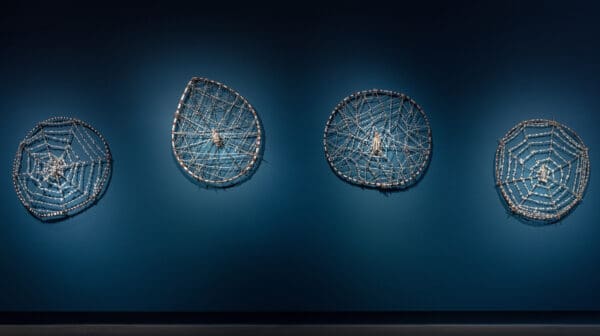
Piercing the veil
A new exhibition at Buxton Contemporary finds a rich complexity in the shadowy terrain between life and death.
Virtual reality and art are not often paired together, but last year Sydney-based artist Joan Ross took the plunge in this still-developing medium after being awarded the second Mordant Family VR Commission.
Ross spent around four months collaborating with Dr Josh Harle of Tactical Space Lab to create Did you ask the river?, which debuts at ACMI on 7 March, just in time for International Women’s Day. The artist, whose practice is primarily based in video, sculpture, installation and print, says this commission allowed her to learn about virtual reality and push the limitations of her work and the medium.
There is a plurality in Ross’s work, and it’s clear that a love of nature underpins much of her work too. Her title, she says. “Is about consulting nature.”
Did you ask the river? transports audiences into a virtual colonial Australia – a common setting for Ross, who has previously used the paintings of colonial and convict artists such as John Glover, Joseph Lycett and others as starting points for her work. Participants experience this world as an 18th-century colonial woman. Her fluorescent yellow outfit blights the landscape, and it is a shade that recurs as a symbol of colonialism throughout Ross’s oeuvre.
Unlike most virtual reality experiences, this work uses a third-person point-of-view instead of first-person, allowing participants to view the landscape from a wider perspective. As you wander around, there are a number of items that you can pick up and play with or collect, including butterflies – collected by colonial scientists for research – and rabbits, which were introduced to Australia in the 1800s for hunting, with far-reaching consequences for native flora and fauna species even to this very day.
Ross explains that in the virtual world she has created, she wants greed to be the basis of destruction. “As people start to interact with things and try to get what they want, they start to destroy the world – they start to embody colonisation,” she says.
Did you ask the river? is filled with subtle and rich details, from the hand-lettered drawer labels that refer to Lieutenant General Watkin Tench’s first-hand accounts of the First Fleet through to the bird sounds recorded by Ross herself. Considering this, it’s not hard to see why it took around four months to create.
Virtual reality posed a whole new array of considerations and challenges for Ross, and while creating Did you ask the river? she had to adapt to new ways of working. The first major obstacle was figuring out ways to “translate art into this new world,” she says, and then on achieving that, learning to compromise her vision a little, especially because she found the game-like appearance “challenging” at first.
Ross is concerned about art and its accessibility, and at times wonders if she is merely preaching to the converted. Because her work touches on big, universal issues, she hopes that its reach – especially in this instance –goes beyond the art scene. “I really want art to help the world, but I don’t know if it really does,” she admits. “I make my work accessible because I want a wider audience.”
Did you ask the river?
Joan Ross
Australian Centre for the Moving Image (ACMI)
7 March – 31 March